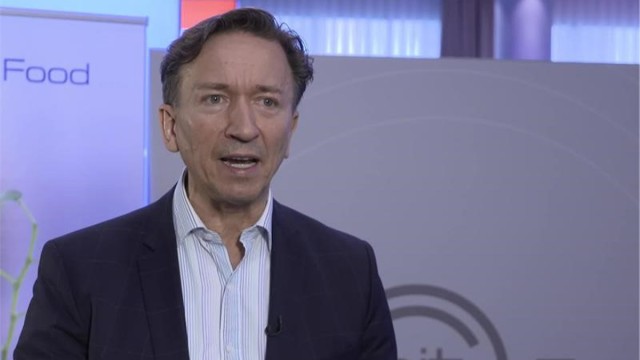Environmentally friendly and plastic-free: The vision of EIT Food
16 Dec 2020

Climate change, renewable energies and environmental protection are current topics with which society is confronted every day. The importance of rethinking is also recognized by the European Institute of Innovation and Technology EIT . The initiative was founded by the European Union in 2008 with the aim of promoting and strengthening Europe's innovative capacity. The initiative brings together companies, educational and research institutions to effectively counteract global challenges. The network includes various Knowledge and Innovation Communities, which have launched a large number of forward-looking projects. Among them is EIT Food, a community whose work is dedicated to the sustainable development of the European food system.
On the Anuga blog, experts answer questions about sustainability and innovation in the food and beverage sector. Food reformer Marc Buckley started the blog, this month Dr. Andy Zynga is a guest in the interview. The founder of several companies and CEO of EIT Food gives exciting insights into topics like environmental friendliness, "zero-waste" and a growing ecological awareness of the population in an in-depth interview.
What impact does sustainability have on the food and beverage sector?
There is no question that the climate crisis has a negative impact on every sector, including the agri-food and beverage industry. However, improving the sustainability of the food system is particularly urgent as it contributes to 26 percent of greenhouse gas emissions, 70 percent of freshwater abstraction and over a third of food waste worldwide.
Our mission at EIT Food is to make the food system more sustainable, healthier and trusted. We believe that we are all responsible for, and connected to, the food that we eat. This means, we all need to work together to improve our food.
We are currently focusing our work on six areas of sustainable food innovation to achieve the greatest scientific, societal and economic impact for this vast and complex sector. Our six areas of focus cover sustainable aquaculture , circular food systems, sustainable agriculture, alternative protein, targeted nutrition and traceability.
What new knowledge and technology-based products and services can enable consumers to lead healthier and more sustainable lifestyles?

The growing awareness of environmental issues has led many of us to change the way we eat, shop and live.
I believe that reducing food waste is a key component in creating a more sustainable lifestyle for consumers. To counteract this, we are radically rethinking the linear model of "make-use-dispose" and instead working towards a circular system that uses all resources with little or no waste. One example of a circular initiative we support is a new digital marketplace for industrial food waste. The platform, called "Circado", is a new online technology for food companies that connects suppliers who want to sell off-stream processing with buyers who want to reuse it for a new purpose. The platform simply offers the surplus items generated during food processing, makes them useful to potential buyers and is exactly the kind of innovation with a big impact that we are happy to support.
What impact does the "zero waste" movement have on environmental sustainability?
According to the FAO, about one third of the food produced in the world is wasted. In Europe alone, some 88 million tonnes of food are wasted, at a cost of €143 billion.
There are now seven billion people in the world. We know that in order to feed a growing world population and assure their food security, we will have to sustainably increase food production and productivity, whilst also reducing food losses and waste.
In my opinion, the zero-waste movement is key in shining a light on the excessive amount of waste produced by individuals, organizations and countries across the world. It shows that reducing food waste can have far-reaching benefits that go beyond saving money. The European Commission calls food waste an ethical, economic and environmental issue, and the reduction of food waste is now part of the Farm to Fork Strategy of the European Green Deal.
As food waste prevention is part of the EU’s plan for a circular economy, EIT Food is supporting a variety of initiatives and food waste technologies that will facilitate this transition.
How do packaging-free stores increase ecological awareness? What are their main advantages?
In my view, supermarkets’ investment in packaging-free stores has generated welcome mass awareness that is critical to reducing plastic use on a large scale.
Packaging-free stores provide fresh, creative ways to make packaging-free shopping easy and desirable for customers. For example, Ekoplaza in the Netherlands has devoted an aisle to 700 ‘plastic-free’ products. In addition, Waitrose (one of our partners in EIT Food) in the UK is trialling reducing single-use plastic through customers filling up their own containers, beer on tap and pick ’n’ mix frozen fruit sections.
Which long-term measures need to be taken to decrease plastic usage significantly?
There are several steps we can take to decrease plastic usage over the long-term. One brilliant example of a campaign pushing for long-term measures from a European alliance of NGOs, active groups, citizens and supporters is Rethink Plastic. They are calling for urgent action in three key areas: reduction, redesign and better management of plastics.
This alliance was instrumental in the adoption of the “Directive on the reduction of the impact of certain plastic products on the environment” (commonly referred to as the Single-Use Plastics (SUP) Directive) which came into force in July 2019. It aims to tackle pollution from single-use plastics (and fishing gear), as the items most commonly found on European beaches, and makes recommendations on how national decision makers can best implement provisions on single-use plastic.
In my mind, an important area of focus is to make compostable packaging alternatives available for mass production. Startups like TIPA manufacture bio-based, fully compostable packaging for the food and fashion industries. It compares its packaging material to orange peel, decomposing in 180 days in compost conditions.
We are also supporting a project that is looking to convert food waste into new types of alternative packaging to reduce the need for single-use and hard-to-dispose plastic. Though both of these solutions are in their early stages, transition to mass production should be the focus. The adoption of these alternatives can already be seen by major corporates like Nestle (another one of the EIT Food partners), who recently developed a high-speed, mass-production method to wrap its ‘Yes’ bar in paper.
How can food and beverage companies lower their amount of waste during the production process?
Food waste is generated throughout the food value chain, but a staggering 30 - 40 percent occurs in production and processing.
I believe food and beverage companies need to look to new technologies to reduce food loss, energy and water consumption across the supply chain. We are supporting our community to develop new food manufacturing processes with quality standards and guidelines for zero-waste. This includes diversifying the use of raw materials, reducing microbial/chemical contamination risks, as well as engaging consumers to enhance recycling and reduce food miles.
One exciting EIT Food project that addresses food waste is a production-planning tool for bakeries. The tool uses AI to record and then predict consumer preferences, understanding the bread that is popular on certain days, and helping to measure the right amount to produce. This is one example where new technology can adapt to consumers’ preferences to minimize unnecessary waste.
Does buying local and organic products positively affect ecological health in your point of view?

COVID-19 has put global food systems under pressure like never before and has led to a shift in shopping habits and development of more small-scale production. As seen in a recent Food Standards Agency (FSA) report, many consumers are now buying their food locally and many farms are now for the first time selling directly to local communities.
As a result, many consumers have changed what they eat and have felt the positive impact of investing in their local community.
I consider there to be many economic benefits of buying locally. This includes farmer retention on farmlands, import substitution, greater income generation at the community level and employment growth (FAO). What’s more, local procurement can reduce the negative environmental impacts associated with food transportation. This includes reduced greenhouse gas emissions and other pollutants which are harmful to human health and the environment.
Next year's Anuga 2021 will once again offer a unique presentation of groundbreaking global trends that provide an outlook on the sustainable future of the food and beverage sector. One of the Food Trends in the upcoming edition will be, for example, the topic "Sustainably Produced or Packaged".

